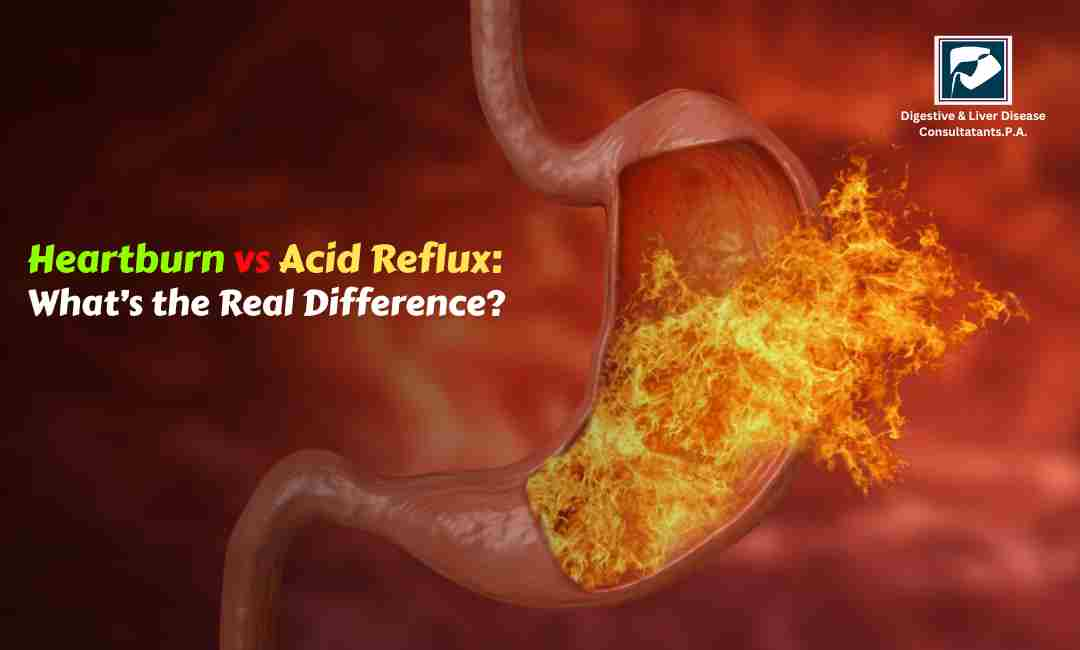Most people use these two terms as if they mean the same thing. A burning chest. Sour taste in the mouth. That uncomfortable feeling after a heavy meal. It all gets thrown into one bucket. But here’s the thing. Heartburn and acid reflux are connected, yet they are not identical. Understanding the difference helps you treat the right problem instead of guessing your way through symptoms.
What Acid Reflux Actually Is
Acid reflux happens when stomach acid moves in the wrong direction and rises into the esophagus. Your esophagus is the tube that carries food from your mouth to your stomach. There’s a small valve at its bottom called the lower esophageal sphincter. Its job is to stay shut so stomach acid doesn’t escape upward.
When this valve becomes weak or relaxes too often, acid slips back up. That backward flow of acid is what we call acid reflux.
What this really means is that acid reflux is the root problem and everything else, including heartburn, is a symptom of it.

Common signs of acid reflux
- Sour or bitter taste in the mouth
- Feeling of food coming back up
- Burping more than usual
- Bloating
- Mild chest discomfort, especially after meals
- A heavy or tight feeling in the upper abdomen
Acid reflux can happen occasionally, and that’s normal. But when it becomes frequent, it’s part of a chronic condition called GERD, which stands for gastroesophageal reflux disease.
So Where Does Heartburn Fit In
Heartburn is a symptom of acid reflux. It’s the burning sensation that rises from your upper stomach toward your chest and sometimes even your throat.
Here’s an easy way to remember it.
Acid reflux is the event. Heartburn is the feeling.
Many people think heartburn has something to do with the heart because of its name. But the heart has nothing to do with it. The pain sits behind the breastbone, which is why it can be confusing.
What heartburn feels like
- A burning or warm sensation in the chest
- Pain that worsens after eating spicy, fatty, or acidic foods
- Discomfort that gets worse when lying down after a meal
- A feeling that something is stuck in the throat
Heartburn can last a few minutes or a few hours. Sometimes it comes with a bitter or sour aftertaste because of acid moving up.
Why These Conditions Happen?
Both acid reflux and heartburn develop for similar reasons. A few everyday habits and lifestyle factors can make them worse.
Common triggers
- Eating large meals
- Eating too fast
- Sleeping right after eating
- Spicy foods
- Citrus fruits
- Tomatoes
- Chocolate
- Coffee
- Carbonated drinks
- Alcohol
- Smoking
- Being overweight
- Wearing tight clothes that press on the stomach
Even stress can make symptoms feel worse. It doesn’t cause acid reflux directly, but it influences how your gut behaves.
Heartburn vs Acid Reflux: Quick Comparison
Acid Reflux
- Backward flow of stomach acid
- Can happen without heartburn
- May include burping, bloating, sour taste
Heartburn
- A burning feeling in the chest
- A symptom caused by reflux
- Doesn’t always include other digestive symptoms
Acid reflux can exist without heartburn. Heartburn cannot exist without acid reflux.
When It Turns Into GERD
If you experience heartburn or reflux more than twice a week, doctors consider it chronic. That’s when GERD enters the picture. This condition can damage the lining of your esophagus if untreated.
Signs it may be GERD
- Frequent heartburn
- Long term sore throat
- Ongoing cough
- Hoarse voice especially in the morning
- Trouble swallowing
- Chest pain after meals
GERD is common, but it needs medical guidance. Leaving it untreated can lead to complications like esophagitis, ulcers, strictures, and Barrett’s esophagus.
How You Can Reduce Heartburn and Acid Reflux?
The good news is that simple lifestyle adjustments can make a huge difference.
- Helpful habits
- Eat smaller meals
- Avoid lying down for at least two to three hours after eating
- Maintain a healthy weight
- Sleep on your left side
- Elevate your head while sleeping
- Limit acidic and fried foods
- Cut back on caffeine, alcohol, and smoking
- Drink water throughout the day
Some people also find relief with over the counter antacids or acid reducers. But these are temporary fixes. If symptoms keep coming back, you need a specialist.
Why Choose Digestive & Liver Disease Consultants, P.A.?
Digestive issues can be confusing, and heartburn is one of those symptoms that often gets ignored until it becomes severe. At Digestive & Liver Disease Consultants, P.A., you get experts who focus entirely on digestive health. Their team uses advanced diagnostic tools, personalized treatment plans, and a patient centered approach to help you understand what’s going on inside your body.
Whether you need evaluation for acid reflux, GERD management, endoscopy, or long term digestive care, this center offers comprehensive support. Patients trust them because of their experience, accuracy in diagnosis, and commitment to long term digestive wellness.
Conclusion
Heartburn and acid reflux may feel similar, but they’re not the same. Acid reflux is the movement of acid. Heartburn is the burning pain that follows. Knowing the difference helps you take smarter steps toward relief.
If you suffer from repeated heartburn, sour taste, chest discomfort after meals, or symptoms that keep coming back, it’s time to get checked.
Schedule an appointment with a specialist at Digestive & Liver Disease Consultants, P.A. and get the right care before it affects your daily life.






